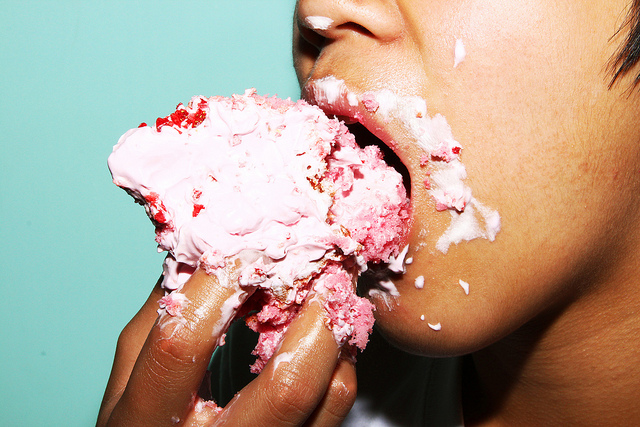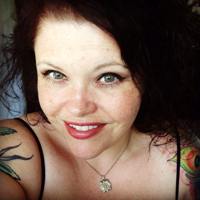My weight has been a telling part of my story.
The times when I was most unhealthy emotionally, my physical health also suffered.
When I think about those times, it saddens me to remember how disengaged I was in my own life. I was unconsciously eating my way through the days, binging away my pain, making excuses, all the while wishing I could change the one thing I never believed I would.
I thought that my failing body had been given a life sentence—that it was my lot in life to be sick, tired, and in pain every day. And truly, until I let go of that idea, I was powerless. I was a prisoner in the jail cell of shame I had built for myself out of 100 pounds of self-hatred.
There are so many layers to eating disorders, so many facets to the mind-body connection, and so many reasons why we self-medicate, celebrate, punish, reward, and comfort ourselves with food. I can only speak to my experience, which has been one of the most amazing ways to figure out who I am at my center. To find the key to taking control of my eating, and therefore my health, was answering one critical question: Why?
Why was I creating so much suffering for myself? Why was I content to live a life in which the only thing I had to look forward to was what I would eat that day? Why did I fail every time I tried to lose the weight? Why did I require a hundred pounds of insulation to walk through the world—what was I hiding from? And why couldn’t I see myself clearly?
My eating disorder began in childhood. It was a manifestation of my pain and shame from sexual abuse in my early years. I was overweight in school, and an easy target for all the bullies. In high school, I traded one eating disorder for another— choosing to starve myself into a body shape that would be more desirable, more acceptable.
Without the comfort of binge eating, I quickly learned to self-medicate in other ways. I drank too much, I experimented with drugs, I carved designs into my ankles with a razor blade. I was careless with my body, careless with my life.
As an adult, I reverted back to my old patterns of food addiction, overeating, and binge eating. At my heaviest, I was 100 pounds overweight. I was so numb I couldn’t even see it.
I knew that I needed to go to a special store to buy my size 24 clothing. I knew that I was eating fast food almost daily, if not multiple times a day. I knew that I was taking medication for diabetes and high blood pressure.
I knew that food was my dirty little secret—that I was eating when and where no one would see me. I had rituals for binging and I planned them carefully. I knew that I was addicted to certain foods—I felt I couldn’t live without them.
I knew all of these things logically, but when I looked in the mirror I couldn’t see the weight. My mental image of myself was someone much smaller than I was. I knew I was heavy, but it was only in photographs that I could see exactly how heavy.
The image I saw through a camera lens was so foreign to me it was shocking. It was like looking in a fun house mirror: distorted, exaggerated. I quickly became the photographer in every social situation to avoid being photographed. I couldn’t bear to see myself as the camera saw me.
Losing the weight has been a long road for me—one that I am still traveling one day at a time. To see the progress of my weight loss, I take pictures of myself and put them side by side with older pictures. Comparing the way I looked 70 pounds heavier to the way I look today has been an amazing experience. It’s helped me see the changes I’ve made in my life. It’s helped me to feel better in my skin.
Though I feel much more self-aware now, and more in control, there is still fear.
Fear that I will fail again. Fear that I will succeed. Fear that the loose skin that is left when the fat is gone won’t allow me to love and accept my body completely. Fear that my demons will come back to haunt me, and I’ll let my old habits creep back into my life. Fear that I’ll go too far in the other direction again.
The greatest lesson I have learned from my eating disorder, isn’t what to eat or how to exercise. The greatest lesson was realizing that no matter how hard I tried, I could never hate my body into good health. She didn’t need to be scolded, shamed, or abused any longer. I used to believe that I had to get in the gym and kill myself to lose weight, or that I should be starving all the time. I always did more harm than good with that approach, and I always gained the weight right back.
To truly fix what was broken, what my body needed was love. She needed for me to get engaged with her. I had to learn the cues she gave me to tell me when to eat, when to stop, when to exercise, when to rest. I had to learn which foods were good for my body, and which were not. I had to identify my triggers, and learn how to either avoid them, or be prepared for them.
I had to give my body a sincere apology for all the years I spent hating and abusing her. I made a decision to treat her with the kindness and respect that she deserves. Imperfect as she is, she was created to carry my soul through this lifetime. She carried my children and nourished them in the first days of their lives. She has climbed mountains, and swam in the ocean, and stood in the Taj Mahal. I can only be grateful for her and the experiences she has allowed me on this earth. I now express my gratitude with action, caring for her the way I wish I always had.
Author: Renee Dubeau
Image: CC_photoshare/Flickr
Editors: Catherine Monkman; Emily Bartran
 Share on bsky
Share on bsky






Read 6 comments and reply